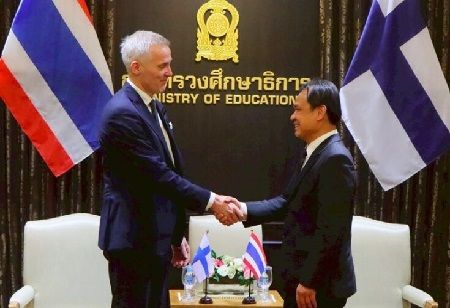- Thailand’s Deputy Education Minister Ong-at Wongprachum met Finland’s Education Minister Anders Adlercreutz to review and advance the Thai-Finnish education cooperation signed in 2022.
- Discussions focused on vocational education, lifelong learning, and aligning curricula with labor market needs to address skills gaps and workforce challenges.
- A new MoU was signed to develop programs in automation, ICT, and hospitality, enhancing practical industry-relevant skills through collaboration between Thai and Finnish institutions.
Thailand's Deputy Education Minister Ong-at Wongprachum met with Finland's Minister of Education Anders Adlercreutz in Bangkok to review progress and discuss the future trajectory of the Thai-Finnish education cooperation agreement, originally signed in 2022. The high-level meeting included senior officials from both countries, along with Finland's Ambassador to Thailand Kristiina Kuvaja-Xanthopoulos.
Minister Adlercreutz expressed Finland's condolences on the passing of Her Majesty Queen Sirikit, Queen Mother, while reaffirming Finland's continued commitment to deepening the bilateral education partnership. Both parties recognized the shared challenges that their countries are confronted with, including aging populations and skills gaps in the workforce. Finland was able to emphasize vocational education and lifelong learning as key components in confronting these dual challenges, sharing experiences and best practices that might contribute toward Thailand's current reform efforts in education.
Thailand emphasized employability enhancement in addition to education being aligned with labor market requirements, a reflection of the wider government strategy toward ensuring youths are equipped with relevant skills in an economy that is rapidly evolving. The meeting also allowed taking stock of various ongoing initiatives under the cooperation framework. These include an MoU on vocational education with Omnia Education Partnerships and Tavastia Edu, which has helped facilitate student exchanges, curriculum development, and knowledge sharing in technical fields.
Another key initiative highlighted was the participation of more than 100 Thai students in a six-week programme at Finland’s Aalto University to immerse students in Finnish educational methods, innovation skills, and foster international collaboration. These were cited as examples of successful engagement that benefit both Thai students and educational institutions.
Also Read: The Rise of Educational Startups in Asia
The two sides also witnessed the signing of another MoU during the visit, aimed at further enhancing vocational education and closer cooperation between educational institutions and industry. The new agreement first aims to develop curricula for automation technology, ICT, and hospitality sectors with high growth potential. The MoU aims to provide a framework for Thai educational institutions to work closer with Finnish partners and domestic industries to ensure that students receive practical, industry-relevant skills while benefiting from Finland's globally recognised vocational education expertise.
Emphasizing long-term cooperation, both Thailand and Finland underlined their joint commitment to shaping innovative, skills-oriented models of education to meet labor market needs. Blending Finnish expertise in lifelong learning and professional training with Thai strategic goals of employability and vocational alignment, the partnership works toward better workforce readiness and international cooperation. As reflected by the new MoU and on-going programs, such efforts signal a sustained focus on turning ideas into active, meaningful projects that better prepare Thai students with key competencies for the modern economy while enriching educational relations between the two countries.

